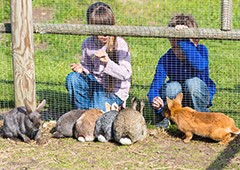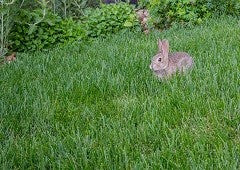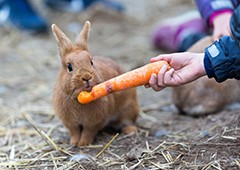If you are lucky enough to have a fluffy little rabbit friend, you will know what delightful pets they make- hopping and flopping about, and always around in times of cuddles and scratches.
While rabbits are considered quite low maintenance pets, there a few things they require to keep them happy and healthy for many years.
We have exhausted all of our resources, and compiled a list of tips that will help you out when it comes to caring for your fellow floppy eared friend.

-
Make sure they have a safe and secure house. Whether it’s an indoors cage or outdoor hutch, it is important that they can feel safe and secure in this area as rabbits are very timid creatures. It should give them plenty of space for them to play in, as well as a sheltered area they can retreat to and sleep in.
-
Clean their living quarters regularly. Muck out any of their droppings and refresh any straw or bedding on a regular basis to help decrease the risk of disease.
-
Fresh hay makes up the bulk of your rabbit's diet. Make sure it is available to your fluffy friend at all times.
-
You should feed your rabbit around 2-4 cups of varied veggies each day. Some ideal vegetables include; spinach, carrots, kale, romaine lettuce and carrot tops.
-
Pellets also make up an important part of your rabbit's diet. When they are younger (up to 6 months) they should have unlimited access to pellets. After this, they should be limited to no more than ¼ cup per day for every five pounds of their body weight.
-
Rabbits MUST have access to fresh, clean water at all times- place several water sources around their hutch and the house to ensure they are never without.
-
Bunnies are particularly hygienic, but will require regular brushing to keep their coat clean and prevent the instance of hairballs occurring.
-
Your rabbit's nails will grow quite quickly, so it is important to keep them short by trimming them regularly. You can use human nail scissors, or those designed for small animals.
-
It is of the highest importance that you get your rabbit desexed! It reduces their aggressiveness, improves their behaviour and will also help to eliminate many serious health issues.
-
Regularly check on your rabbits weight- you should be able to feel their ribs just under the skin, with no thick layer of fat.
-
Check that their eyes, ears and nose are clean and clear- if not, it is a sign that they may be ill, and so should be taken to a vet for further advice.
-
Make sure you provide your bunny with plenty dried chewing materials such as hay and apple and citrus tree branches to help keep their teeth worn down and healthy.
-
Bunnies, like many animals, get bored. So provide them with plenty of stimulation such as tunnels and toys, adding new fun things regularly.
-
Rabbits require LOVE! Give your furry little forever friend lots of love and attention on a regular basis. They are very sociable creatures that crave companionship, so it is important to interact with your bunny and incorporate them into your life- whether it’s a play before work and a kiss and cuddle while watching TV at night, it will all count towards keeping your companion happy and healthy.
So, please consider this little list before you run out and get yourself a couple of hopping companions. Rabbits are a fantastic source of companionship and are so easy to fall absolutely in love with. Don’t feel discouraged but please make sure you are ready for the commitment.
If you’re super excited about getting a couple cuddly little rabbits but are unsure of where you are going to keep them, why not check out our range of rabbit enclosures, such as the Hoppy Hotel, Wiggle Den and Rabbit Den- they’ll surely keep your little loved ones healthy, happy and bouncy.
















